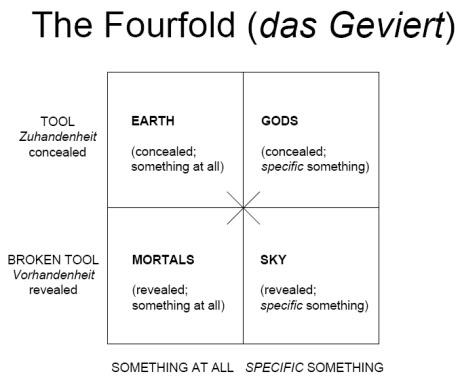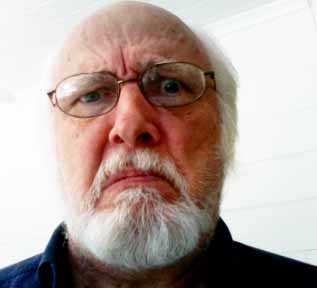 Appiphany consults on well-being as capacity, capability, updated for the epoch and apparatus of electracy. Heidegger is a primary source for this update, since his originality in the tradition of metaphysics is to have transposed Aristotle's Ethics into ontology. His insight was that the greatest danger (the completion of literate metaphysics in our techno-scientific civilization) is also the opportunity for rescue. The autarchy of technics now transforms the decision of a phronimos into an ontological opportunity: not just that a given political or ethical behavior might be otherwise, but that reality itself may become other than we find it. Heidegger retains the terms of the tradition from Aristotle, to convey a shift of emphasis from telos, cause, being as permanent present product (from a preference for energeia, actualitas, the what-is of substance), to becoming possible, potentiality, dunamis. "Translated literally," Heidegger writes, referring to Parmenides, "the esti thus emphasized does mean 'it is.' But the emphasis discerns in the esti what the Greeks thought even then in the esti thus emphasized and which we can paraphrase by: 'It is capable.' However, the meaning of this capability remained just as unthought, then and afterward, as the 'It' which is capable of Being. To be capable of Being means: to yield and give Being. In the esti there is concealed the It gives" (Heidegger, Time and Being, 8).
Appiphany consults on well-being as capacity, capability, updated for the epoch and apparatus of electracy. Heidegger is a primary source for this update, since his originality in the tradition of metaphysics is to have transposed Aristotle's Ethics into ontology. His insight was that the greatest danger (the completion of literate metaphysics in our techno-scientific civilization) is also the opportunity for rescue. The autarchy of technics now transforms the decision of a phronimos into an ontological opportunity: not just that a given political or ethical behavior might be otherwise, but that reality itself may become other than we find it. Heidegger retains the terms of the tradition from Aristotle, to convey a shift of emphasis from telos, cause, being as permanent present product (from a preference for energeia, actualitas, the what-is of substance), to becoming possible, potentiality, dunamis. "Translated literally," Heidegger writes, referring to Parmenides, "the esti thus emphasized does mean 'it is.' But the emphasis discerns in the esti what the Greeks thought even then in the esti thus emphasized and which we can paraphrase by: 'It is capable.' However, the meaning of this capability remained just as unthought, then and afterward, as the 'It' which is capable of Being. To be capable of Being means: to yield and give Being. In the esti there is concealed the It gives" (Heidegger, Time and Being, 8).
There is much to unpack in this dense passage, but for now a point of relevance for Appiphany is the consequences of Heidegger's shift of emphasis, from presence to absence, from life to death. What most belongs to humans is our capacity for death, our finitude. Heidegger embrances Aristotle's association of Being with movement, understanding movement as temporal as well as spatial, mental and logical as well physical. Here is a primary purpose of ubiquitous computing: to track all dimensions of movement. Well-being must be apprehended through the mobility of Being itself. Thinking opens a path, Heidegger proposes, and Appiphany supplies the GPS for this passage. Mortals experience time as care (Sorge), through moods such as Anxiety, and the most relevant trajectory is not only biological (entelechy), but historical (Ereignis, event). Any individual choice, and even any policy decision deliberated in a community, is belated, enframed by an epochal decision, a fatal commitment of the civilization, such as the one made by the Classical Greeks that determined the destiny of Western civilization through the epochs of the literate apparatus.
Part of the responsibility of a konsult is to prepare egents for this alternative mode of thought. Heidegger found the clue in the Greek word for "truth" -- aletheia -- whose etymology Heidegger exploited to translate as "unconcealment." Being is experienced as a disclosive withdrawal: the withdrawal of the opening that gives the gift of beings (That things are) is ignored and forgotten in favor of the gift (What things are). We are at the end (telos) or completion of one possible relation with Being (as product, beings as useful), and Heidegger suggests that there are still more possibilities (potentiality of Being). Heidegger's thought prepared the transition to electrate metaphysics by offering poetry in particular, and the arts in general, as the mode of language appropriate to the task of thinking for the coming community. Part of the project of our consulting is to design and test this alternative operating system, following this invention thread of potentiality and capacity.
Aristotle's metaphysics includes an heuretic template, in his strategy of form and matter, which in practice meant applying his logical square (the inferential passage of opposition --contraries, contradictions, complements) to the elements of matter (Earth Air Fire Water). That is a choral template. Heidegger adopts the same strategy, replacing the logical square of conceptual thinking with the Fourfold (das Geviert) chiasmatic belonging together of Earth Sky Divinities Mortals borrowed from Hölderlin. This template will be developed further.
See On Time and Being, Martin Heidegger, Trans Joan Stambaugh, New York: Harper & Row, 1972.

